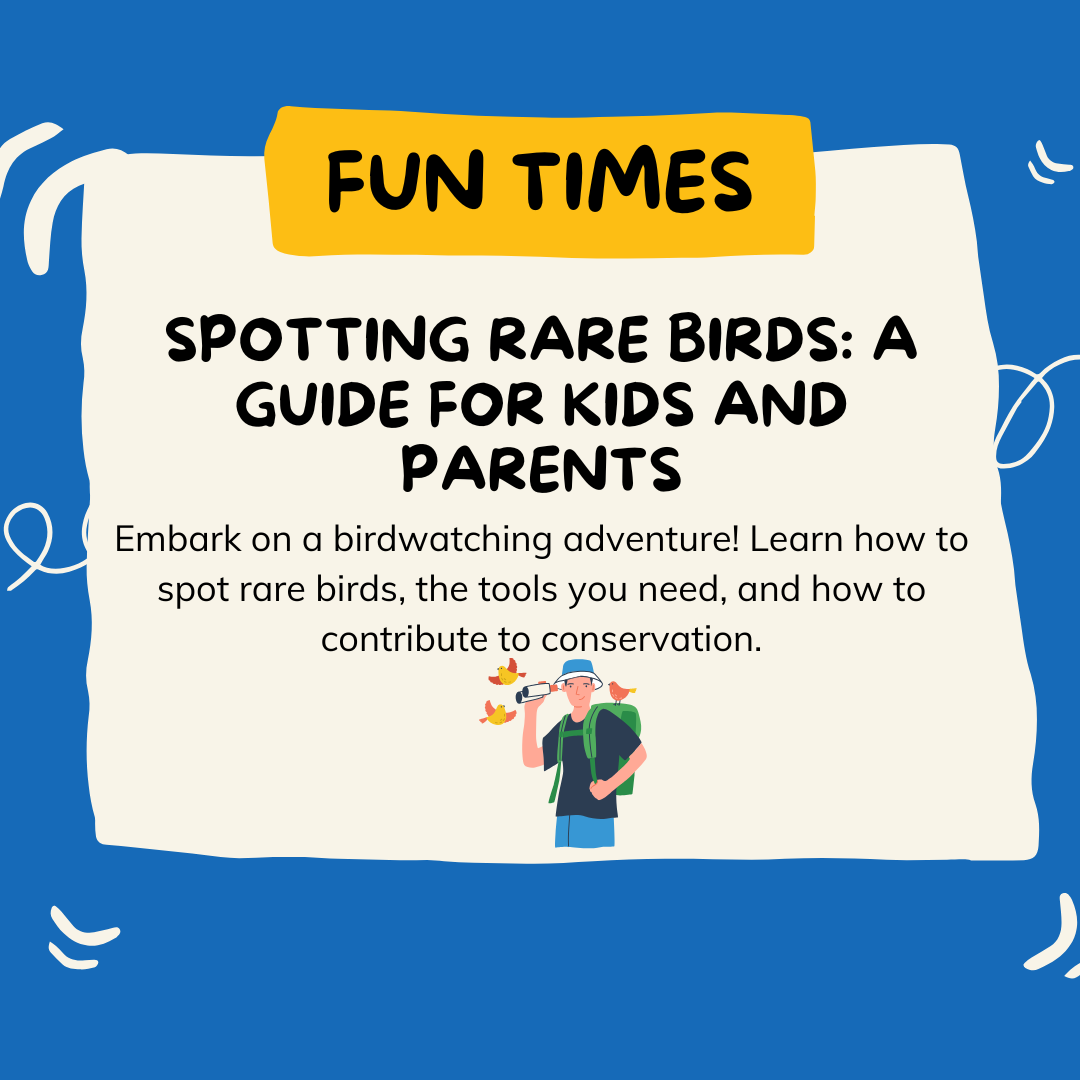Introduction:
Hey there, young explorers and parents! Have you ever dreamt of seeing a bird so rare it’s like finding a hidden treasure? Imagine a bird with feathers like rainbows or one that can mimic almost any sound! That’s the magic of rare birds! They’re like nature’s little secrets, waiting to be discovered. In this guide, we’ll learn how to find these amazing creatures, what tools we need, and how to become true birdwatching detectives!
Why Spotting Rare Birds is Super Cool:
Finding a rare bird is like unlocking a secret level in a video game! It’s exciting, rewarding, and teaches us so much about the natural world. Here’s why it’s so awesome:
- Become a Nature Detective: Rare birds are like puzzle pieces that help us understand the environment. By finding them, we learn about their special habitats, their challenges, and how we can help protect them. It’s like becoming a nature detective, solving the mysteries of the bird world!
- Amazing Adventures: Searching for rare birds takes us to incredible places, from lush forests to towering mountains! We get to explore nature, breathe fresh air, and discover hidden wonders along the way. It’s an adventure that the whole family can enjoy!
- Helping Birds: When we spot rare birds, we can help scientists and conservationists learn more about them and protect their homes. It’s like being a superhero for birds, helping them thrive in a changing world!
- Making Memories: Imagine the stories you’ll have to tell after spotting a rare bird! It’s a memory that will last a lifetime, and you can share your amazing experience with friends and family.
Gearing Up for the Birdwatching Adventure:
Every good explorer needs the right tools! Here’s what we need to become expert birdwatchers:
- Binoculars: These are like magic glasses that bring birds closer! They help us see those colorful feathers and unique markings up close. Choose binoculars that are lightweight and easy to handle, especially if you’re exploring forests or hiking trails1.
- Technology to the Rescue: Our smartphones can be powerful birdwatching tools! There are apps that can identify bird calls, keep track of our sightings, and even help us find the best birding spots. It’s like having a bird expert in your pocket!
- Dress for Success: Comfortable clothes and sturdy shoes are a must! We might be walking, climbing, or even wading through streams, so we need to be prepared for anything. Don’t forget a hat, sunscreen, and a backpack to carry water and snacks1.
Mastering Birdwatching Techniques:
Now that we have our gear, let’s learn how to become expert bird spotters:
- Sharpen Your Senses: Birdwatching is more than just looking! We need to listen to their songs, observe their behavior, and notice those tiny details that make each bird special. It’s like becoming a bird whisperer, understanding their secret language!
- Timing is Everything: Birds are most active in the early morning and late afternoon. That’s when they’re busy searching for food and singing their hearts out. So, set your alarm clock and get ready for an early morning adventure!
- Know Your Birds: Field guides and bird identification apps are our best friends! They help us learn about different bird species, their habitats, and their unique characteristics. It’s like having a bird encyclopedia at our fingertips!
- Keep a Bird Journal: A journal is like a treasure map for birdwatchers! We can record our sightings, draw sketches, and write notes about the birds we see. It’s a fun way to remember our adventures and learn even more about birds.
Joining the Birdwatching Community:
Birdwatching is even more fun with friends! Here’s how to connect with other bird enthusiasts:
- Birdwatching Clubs: Joining a birdwatching club is like having a team of bird experts to guide you! You can learn from experienced birders, share your sightings, and even go on group birdwatching trips.
- Bird Festivals and Events: Bird festivals are like parties for bird lovers! There are games, workshops, and guided tours where you can learn about birds and meet other passionate birdwatchers.
- Citizen Science: You can be a scientist too! Many organizations need help with bird counts and surveys. By participating, you’ll contribute to real scientific research and help protect birds.
Protecting Our Feathered Friends:
Birds face many challenges, from habitat loss to climate change. Here’s how we can help:
- Be a Bird Buddy: When we’re out birdwatching, it’s important to respect their space and not disturb their nests or their babies. We can observe them from a distance and enjoy their natural behavior without causing any harm.
- Protect Their Homes: Birds need trees, clean water, and healthy habitats to survive. We can help by planting trees, reducing pollution, and keeping our parks and natural areas clean.
- Spread the Word: Tell your friends and family about the amazing world of birds! The more people who care about birds, the better we can protect them and their environment.
Frequently Asked Questions (FAQ)
Q: What makes a bird rare?
A: A bird can be rare for many reasons. Some birds live in faraway places that are hard to reach, while others are losing their homes due to habitat destruction. Some birds are just naturally rare, with small populations that need our protection2.
Q: Where can I find rare birds?
A: Rare birds can be found in all sorts of places, from national parks and wildlife refuges to your own backyard! Researching local birding hotspots and learning about bird migration patterns can increase your chances of spotting something special3.
Q: What’s the best way to identify a rare bird?
A: Take a photo if you can! It will help you remember the bird’s details and compare it to pictures in field guides or apps. Pay attention to its size, shape, colors, and any unique markings. You can also listen to its calls and observe its behavior4.
Q: What should I do if I find an injured bird?
A: It’s best to contact a local wildlife rehabilitator or animal rescue organization. They have the expertise to care for injured birds and give them the best chance of survival.
Q: How can I learn more about birds?
A: There are so many ways to learn about birds! You can visit libraries, explore online resources, join birdwatching clubs, and even volunteer at bird sanctuaries. The more you learn, the more you’ll appreciate these amazing creatures!
Conclusion:
Spotting rare birds is an exciting adventure that connects us with nature and teaches us about the importance of conservation. By learning about birds, respecting their environment, and sharing our passion with others, we can all play a part in protecting these amazing creatures for generations to come. So grab your binoculars, put on your explorer hat, and get ready for an unforgettable birdwatching journey!
Happy Birding!

